
The Organisation armée secrète was a far-right dissident French paramilitary and terrorist organisation during the Algerian War, founded in 1961 by Raoul Salan, Pierre Lagaillarde and Jean-Jacques Susini. The OAS carried out several terrorist attacks, including tortures, bombings and assassinations, all resulting in over 2,000 deaths in an attempt to prevent Algeria's independence from French colonial rule. Its motto was L’Algérie est française et le restera.
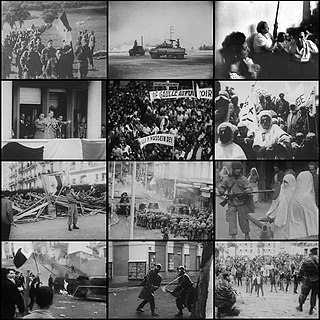
The Algerian War was a major armed conflict between France and the Algerian National Liberation Front (FLN) from 1954 to 1962, which led to Algeria winning its independence from France. An important decolonization war, it was a complex conflict characterized by guerrilla warfare and war crimes. The conflict also became a civil war between the different communities and within the communities. The war took place mainly on the territory of Algeria, with repercussions in metropolitan France.
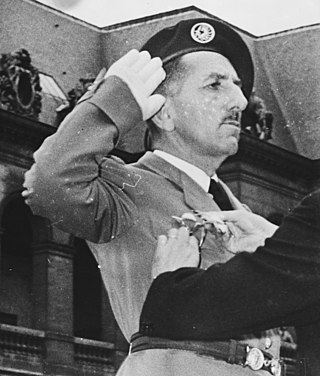
Jacques Émile Massu was a French general who fought in World War II, the First Indochina War, the Algerian War and the Suez Crisis. He led French troops in the Battle of Algiers, first supporting and later denouncing their use of torture.

Raoul Albin Louis Salan was a French Army general and the founder of the Organisation armée secrète, a clandestine terrorist organisation that sought to maintain French Algeria by preventing Algerian independence. He served as the fourth French commanding general during the First Indochina War. He was one of four retired generals who organized the 1961 Algiers putsch operation. He was the most decorated soldier in the French Army at the end of his military career.

Marcel Bigeard, personal radio call-sign "Bruno", was a French military officer and politician who fought in World War II, the First Indochina War and the Algerian War. He was one of the commanders in the Battle of Dien Bien Phu and is thought by many to have been a dominating influence on French "unconventional" warfare thinking from that time onwards. He was one of the most decorated officers in France, and is particularly noteworthy because of his rise from being a regular soldier in 1936 to ultimately concluding his career in 1976 as a Lieutenant General and serving in the government of Valéry Giscard d'Estaing.

Elements from the French Armed Forces used deliberate torture during the Algerian War (1954–1962), creating an ongoing public controversy. Pierre Vidal-Naquet, a renowned French historian, estimated that there were "hundreds of thousands of instances of torture" by the French military in Algeria.
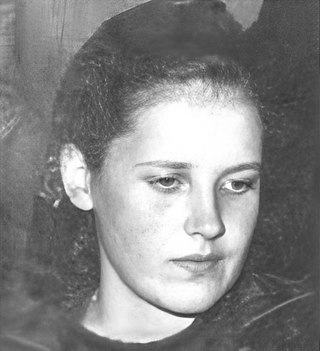
Danièle Minne was one of the few European women convicted of assisting the FLN during the Algerian War. Her mother Jacqueline Netter-Minne-Guerroudj and her stepfather Abdelkader Guerroudj, were both condemned to death as accomplices of Fernand Iveton, the only European who was guillotined for his part in the Algerian revolt. Her mother was never executed, partly due to a campaign on her behalf conducted by Simone de Beauvoir; her stepfather was also freed.

Benjamin Stora is a French historian, expert on North Africa, who is widely considered one of the world's leading authorities on Algerian history. He was born in a Jewish family that left the country following its War of Independence in 1962. Stora holds two PhDs and a Doctorate of the State (1991).
The Battle of Philippeville, also known as the Philippeville massacre or the August Offensive, was a series of raids launched on 20 August 1955 on various cities and towns of the Constantine region by FLN insurgents and armed mobs during the Algerian War between France and the Algerian rebels. The raids, which mostly took the form of ethnic riots, resulted in the massacre of several dozens of European settlers, known as pieds-Noirs. The massacres were then followed by reprisals by the French army and pied-noir vigilantes, which resulted in the death of several thousand Muslim Algerians. The events of late August 1955 in the Constantinois region are considered to be a major turning point of the Algerian War.
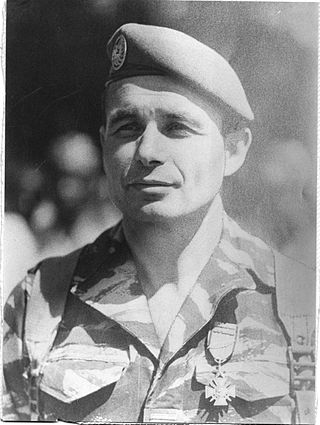
Philippe Louis Edmé Marie François Erulin was a senior French military officer. He is best known as the Colonel Commandant of the 2nd Foreign Parachute Regiment 2e REP, who directed the military intervention in Zaïre during the Shaba II conflict against rebels of the Congolese National Liberation Front (FLNC).

The Battle of Bab el Oued was a violent confrontation which occurred during the latter stages of the Algerian War (1954–1962) between the French Army and the Organisation armée secrète (OAS) which opposed Algerian independence. It took place in Bab El Oued, then a working-class European quarter of Algiers, from 23 March to 6 April 1962.
Yves Courrière, real name Gérard Bon was a French writer, biographer and journalist.
The Battle of Bouzegza took place during the Algerian War in the Berber-speaking region of the Adrar Azegzaw massif, at the far eastern end of the Mitidja Plain.

The Palestro ambush, or Djerrah ambush, took place on 18 May 1956, during the Algerian War, near the village of Djerrah in the region of Palestro in Kabylie. A section of about forty men from the National Liberation Army (ALN) under the command of Lieutenant Ali Khodja ambushed a unit of 21 men from the 9th Colonial Infantry Regiment of the French Army commanded by Second Lieutenant Hervé Artur.
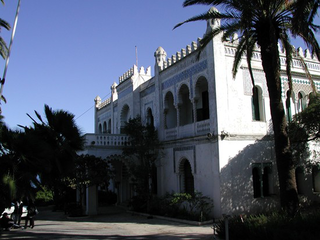
The villa Sésini is a torture center established in El Biar during the Algerian war in the city of Algiers.
Mohamed Aïchaoui was an Algerian journalist and militant in the nationalist movement against French Algeria. Aïchaoui wrote the Declaration of 1 November 1954, the National Liberation Front's first appeal to the Algerian people at the start of the Algerian War. After earlier imprisonment and torture, he died in a 1959 clash with the French army.
Baya Hocine, also known as Baya Mamadi was an Algerian independence fighter.
Jean-Baptiste Albert Antoine Biaggi, known to friends as "Bapt", was a French far-right activist, soldier, French Resistance leader, lawyer and politician. He sided with Charles de Gaulle during World War II, welcoming his return from retirement but rejected Gaullism when Algerian self-determination was granted. He retired from mainstream politics but supported the Front National thereafter.
The Battle of Ath Yahia Moussa was an armed conflict during the Algerian War that took place on January 6, 1959, in the Kabylia region of Algeria. This battle involved the National Liberation Army (ALN) against the French Army.
Alban Liechti was a French anti-colonial militant. He was the first French soldier to refuse to bear arms against the Algerian people.











